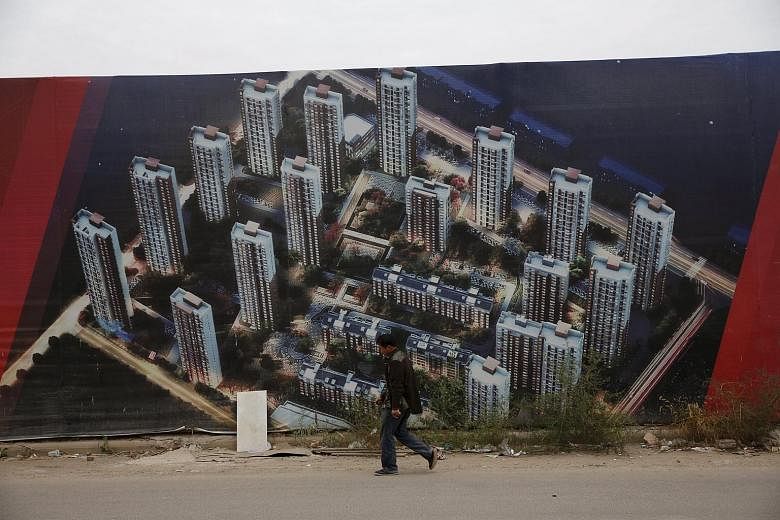SHANGHAI (BLOOMBERG) - China's home-price recovery spread to more cities in November, especially smaller ones, after Chinese authorities rolled out easing measures targeting regions with a surplus of unsold homes.
New-home prices increased in 33 cities among the 70 cities tracked by the government, compared with 27 in October, the National Bureau of Statistics said on Friday Dec18). Prices dropped in 27 cities, compared with 33 in October, and were unchanged in 10.
China's politburo, the top decision-making body of the Communist Party, on Monday vowed to reduce home inventory as one of its key tasks in 2016. The number of unsold new homes nationwide increased 12 percent from a year earlier as of November, the statistics bureau said Dec. 12.
"Most of the stimulus so far has been focused on the demand side," Du Jinsong, a Hong Kong-based property analyst at Credit Suisse, said in an interview on Bloomberg Television on Friday. "I think the government is thinking about supply-side stimulus at the moment. Demand is not unlimited."
"The streak of measures rolled out by the central government to spur sales has kept showing effects," the statistics bureau said in a statement released with the data.
Gains were led by the southern business hub of Shenzhen, where prices jumped 2.9 per cent from a month earlier, faster than the 1.2 per cent advance in October. The financial center of Shanghai trailed Shenzhen to increase 1.6 percent, slower than the 1.8 per cent pace in the previous month. Prices rose 0.8 per cent in the capital city of Beijing and 0.6 per cent in Guangzhou.
The central bank on Oct 23 cut interest rates, the sixth time since November last year, along with a cut on reserve requirements for all banks. This helped bring personal mortgage rates to the lowest in five years, according to Centaline Group.
Gains in new-home prices widened in November from the previous month in first- and second-tier cities, according to the statement.
"The Chinese housing market will likely continue to be a headwind for real gross domestic product growth in 2016, but the data look most consistent with a protracted slump rather than a collapse," Bill Adams, an economist at PNC Financial Service Group, wrote in a note on Friday.
Housing sales gained 18 per cent in November from last year, slightly faster than the 16 per cent increase as in October, though narrower than monthly growth of above 30 per cent in the May-to-August period, according to Bloomberg calculations based on official data released Dec. 12.
The rising sales have yet to revive a sluggish pace of investments. Property investment increased 1.3 per cent in the first 11 months from the same period last year, the slowest pace in more than five years. New-home building starts, a leading indicator of real estate investment, slumped 15 per cent last month from a year earlier, following a 24 per cent decline in October, according to government data.
Real estate investments in November, which slid 5.1 per cent from a year earlier, was "largely below expectation," China International Capital Corp. analyst Ning Jingbian wrote in a Dec 13 note. He cut his forecast for full-year property investments by 2 percentage points to a 2 percent growth. "There is a larger chance that stimulus will be carried out," in the near future, according to Ning.

